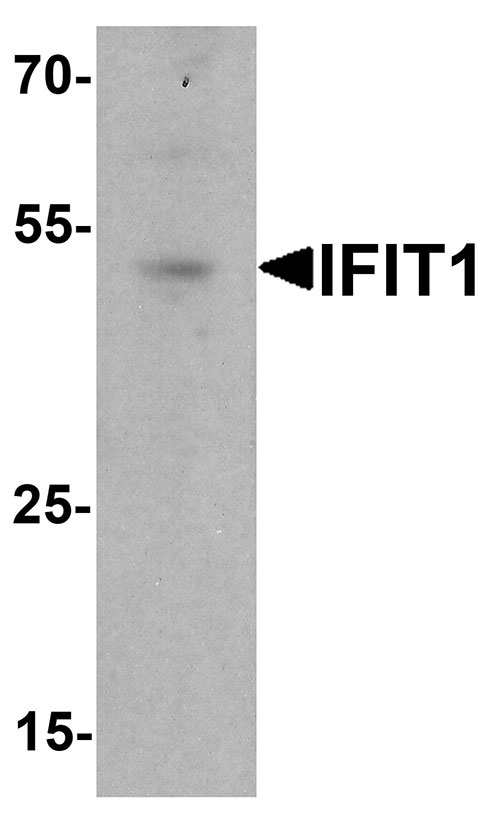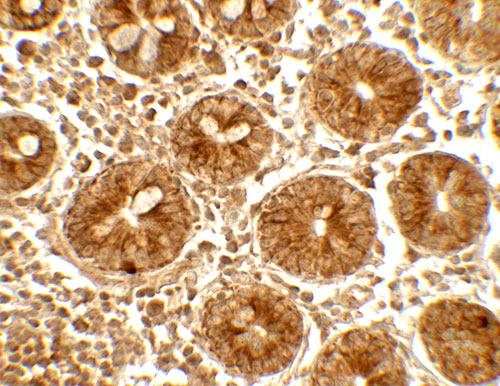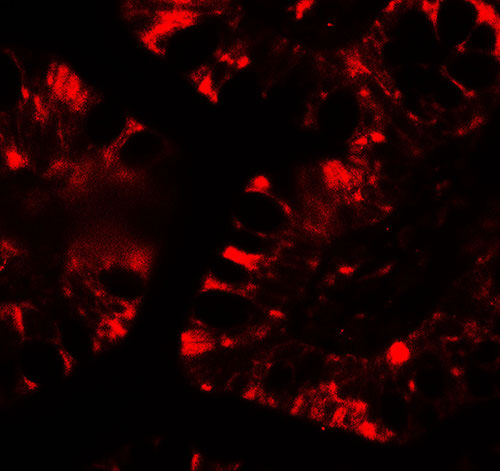IFIT1 Antibody
- SPECIFICATION
- CITATIONS
- PROTOCOLS
- BACKGROUND

Application
| WB, IHC-P, IF, E |
|---|---|
| Primary Accession | P09914 |
| Other Accession | NP_001539, 116534937 |
| Reactivity | Human, Mouse, Rat |
| Host | Rabbit |
| Clonality | Polyclonal |
| Isotype | IgG |
| Calculated MW | Predicted: 53 kDa Observed: 53 kDa |
| Application Notes | IFIT1 antibody can be used for detection of IFIT1 by Western blot at 1 - 2 µg/ml. Antibody can also be used for Immunohistochemistry at 5 µg/mL. For Immunoflorescence start at 20 µg/mL. |
| Gene ID | 3434 |
|---|---|
| Target/Specificity | IFIT1; IFIT1 antibody is human, mouse and rat reactive. At least three isoforms of IFIT1 are known to exist. This antibody is predicted to not cross-react with other members of the IFIT protein family. |
| Reconstitution & Storage | IFIT1 antibody can be stored at 4℃ for three months and -20℃, stable for up to one year. |
| Precautions | IFIT1 Antibody is for research use only and not for use in diagnostic or therapeutic procedures. |
| Name | IFIT1 (HGNC:5407) |
|---|---|
| Function | Plays a key role in the innate immune response as part of an interferon-dependent multiprotein complex, recognizing and sequestering viral RNAs that lack host-specific 2'-O-methylation at their 5' cap. By distinguishing these RNAs from host mRNAs, inhibits their translation by competing with the translation initiation factor eIF4E (PubMed:21642987, PubMed:27240734, PubMed:39009378, PubMed:23334420, PubMed:28251928, PubMed:36285486). Could also prevent viral replication through its interaction with DNA replication origin-binding protein E1 of several viruses. Causes the translocation of E1 from the nucleus to the cytoplasm and can also inhibit its helicase activity in vitro (PubMed:19008854, PubMed:21976647). Exhibits antiviral activity against many viruses from the Flaviviridae (West Nile virus, Dengue virus, hepatitis C virus), Coronaviridae (human 229E coronavirus, SARS-CoV-2 and SARS-CoV), Poxviridae (vaccinia virus) and Togaviridae (Sindbis virus) families (PubMed:19008854, PubMed:21976647, PubMed:28251928, PubMed:36285486). |
| Cellular Location | Cytoplasm |

Thousands of laboratories across the world have published research that depended on the performance of antibodies from Abcepta to advance their research. Check out links to articles that cite our products in major peer-reviewed journals, organized by research category.
info@abcepta.com, and receive a free "I Love Antibodies" mug.
Provided below are standard protocols that you may find useful for product applications.
Background
The interferon-induced protein with tetratricopeptide repeats 1 (IFIT1) protein is a member of a family of tetratricopeptide repeat-containing proteins whose transcription is upregulated by interferons, virus infection, and molecular patterns such as dsRNA or lipopolysaccharides (1,2). These proteins have been suggested to induce anti-viral cellular activities in response to infection (2). Together with the interferon-induced transmembrane protein 1 (IFITM1), IFIT1 inhibits the replication of the Hepatitis C virus, suggesting that it may be useful in the development of therapeutic treatments (3).
References
Wathelet M, Moutschen S, Defilippi P, et al. Molecular cloning, full-length sequence and preliminary characterization of a 56-kDa protein induced by human interferons. Eur. J. Biochem. 1986; 155:11-7.
Fensterl V and Sen GC. The ISG56/IFIT1 gene family. J. Interferon Cytokine Res. 2011; 31:71-8.
Raychoudhuri A, Shrivastava S, Steele R, et al. ISG56 and IFITM1 proteins inhibit hepatitis C virus replication. J. Virol. 2011; 85:12881-9.
If you have used an Abcepta product and would like to share how it has performed, please click on the "Submit Review" button and provide the requested information. Our staff will examine and post your review and contact you if needed.
If you have any additional inquiries please email technical services at tech@abcepta.com.













 Foundational characteristics of cancer include proliferation, angiogenesis, migration, evasion of apoptosis, and cellular immortality. Find key markers for these cellular processes and antibodies to detect them.
Foundational characteristics of cancer include proliferation, angiogenesis, migration, evasion of apoptosis, and cellular immortality. Find key markers for these cellular processes and antibodies to detect them. The SUMOplot™ Analysis Program predicts and scores sumoylation sites in your protein. SUMOylation is a post-translational modification involved in various cellular processes, such as nuclear-cytosolic transport, transcriptional regulation, apoptosis, protein stability, response to stress, and progression through the cell cycle.
The SUMOplot™ Analysis Program predicts and scores sumoylation sites in your protein. SUMOylation is a post-translational modification involved in various cellular processes, such as nuclear-cytosolic transport, transcriptional regulation, apoptosis, protein stability, response to stress, and progression through the cell cycle. The Autophagy Receptor Motif Plotter predicts and scores autophagy receptor binding sites in your protein. Identifying proteins connected to this pathway is critical to understanding the role of autophagy in physiological as well as pathological processes such as development, differentiation, neurodegenerative diseases, stress, infection, and cancer.
The Autophagy Receptor Motif Plotter predicts and scores autophagy receptor binding sites in your protein. Identifying proteins connected to this pathway is critical to understanding the role of autophagy in physiological as well as pathological processes such as development, differentiation, neurodegenerative diseases, stress, infection, and cancer.




